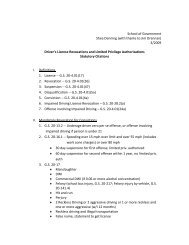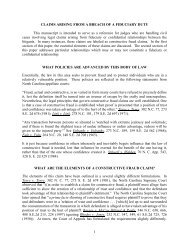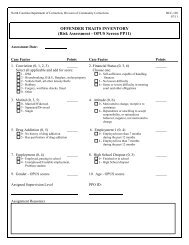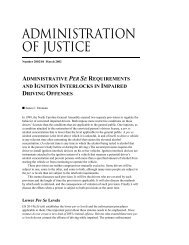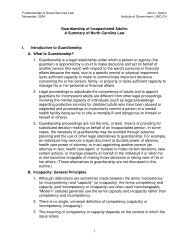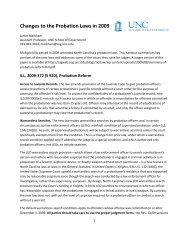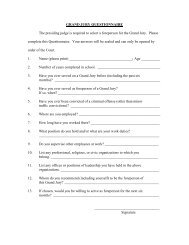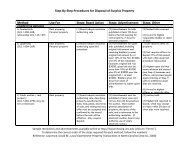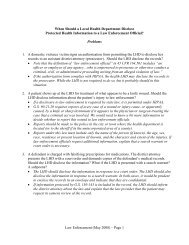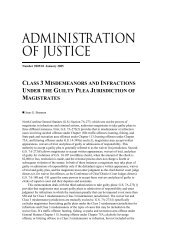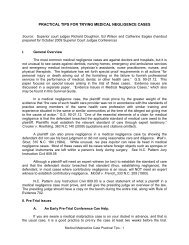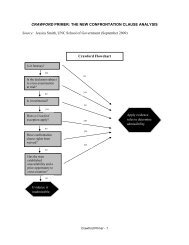Handout 1 - School of Government - University of North Carolina at ...
Handout 1 - School of Government - University of North Carolina at ...
Handout 1 - School of Government - University of North Carolina at ...
You also want an ePaper? Increase the reach of your titles
YUMPU automatically turns print PDFs into web optimized ePapers that Google loves.
Guardian ad Litem for Parent<br />
In an action to termin<strong>at</strong>e parental rights,<br />
1. the sign<strong>at</strong>ure <strong>of</strong> respondent parent’s guardian ad litem on the notice <strong>of</strong> appeal did not s<strong>at</strong>isfy the<br />
requirement th<strong>at</strong> the respondent sign the notice.<br />
2. the role <strong>of</strong> a parent’s guardian ad litem in a termin<strong>at</strong>ion case is to provide assistance, not to<br />
substitute his or her judgment or decisions for those <strong>of</strong> the parent.<br />
In re L.B., 187 N.C. App. 326, 653 S.E.2d 240 (12/4/07), affirmed per curiam, 362 N.C. 507, 666<br />
S.E.2d 751 (10/10/08).<br />
http://www.aoc.st<strong>at</strong>e.nc.us/www/public/coa/opinions/2007/070549-1.htm<br />
Facts: In an action to termin<strong>at</strong>e the parents’ rights, guardians ad litem were appointed for both parents<br />
pursuant to G.S. 7B-1101.1. After the court entered an order termin<strong>at</strong>ing both parents’ rights, both<br />
parents’ <strong>at</strong>torneys and guardians ad litem signed notices <strong>of</strong> appeal. Petitioner made a motion to dismiss<br />
the appeal for failure to comply with Rule 3A <strong>of</strong> the Rules <strong>of</strong> Appell<strong>at</strong>e Procedure.<br />
Held: Appeal dismissed.<br />
1. In juvenile cases, Rule 3A <strong>of</strong> the Rules <strong>of</strong> Appell<strong>at</strong>e Procedure requires th<strong>at</strong> both trial counsel and the<br />
appellant sign the notice <strong>of</strong> appeal. The court held th<strong>at</strong> the sign<strong>at</strong>ure <strong>of</strong> the respondent parent’s<br />
guardian ad litem did not suffice to s<strong>at</strong>isfy the requirement th<strong>at</strong> the parent sign. Failure <strong>of</strong> the parents<br />
to sign the notice <strong>of</strong> appeal deprived the court <strong>of</strong> appeals <strong>of</strong> jurisdiction to consider the appeal.<br />
2. The court <strong>of</strong> appeals contrasted standards for appointing a guardian for an adult under G.S. Chapter<br />
35A, which requires an adjudic<strong>at</strong>ion <strong>of</strong> incompetence, and those for appointing a guardian ad litem<br />
under G.S. 7B-1101.1, which requires only a reasonable basis to believe the parent is incompetent or<br />
has diminished capacity. The court also noted th<strong>at</strong> the provision for appointing a GAL for a minor<br />
parent, unlike the provision applicable to adult parents, specifically references appointment pursuant<br />
to G.S. 1A-1, Rule 17. The court concluded th<strong>at</strong> the role <strong>of</strong> a guardian ad litem appointed under the<br />
termin<strong>at</strong>ion st<strong>at</strong>ute is much more limited than th<strong>at</strong> <strong>of</strong> a guardian under Chapter 35A or a guardian ad<br />
litem under Rule 17 and does not include exercising legal rights in the place <strong>of</strong> the respondent parent.<br />
GAL for parent; willfully leaving child in care<br />
• Trial court abused its discretion by failing to hold a hearing to determine whether respondent needed<br />
a guardian ad litem when circumstances raised substantial question as to whether she was competent<br />
or had diminished capacity.<br />
• The “willfulness” required to establish the ground <strong>of</strong> leaving the child in foster care is “less than<br />
willful abandonment.”<br />
In re N.A.L., ___ N.C. App. ___, 666 S.E.2d 768 (10/7/08).<br />
http://www.aoc.st<strong>at</strong>e.nc.us/www/public/coa/opinions/2008/080510-1.htm<br />
Facts: In addition to other grounds for termin<strong>at</strong>ion <strong>of</strong> parental rights, DSS alleged th<strong>at</strong> both parents were<br />
incapable <strong>of</strong> providing proper care and supervision. The petition alleged th<strong>at</strong> respondent mother had<br />
problems controlling her anger, tended to be aggressive, and lacked understanding <strong>of</strong> the earlier neglect<br />
adjudic<strong>at</strong>ion. Evidence showed th<strong>at</strong> she had an IQ score <strong>of</strong> 74 and was diagnosed as having personality<br />
disorder and borderline intellectual functioning. The trial court found th<strong>at</strong> she had significant mental<br />
health issues th<strong>at</strong> affected her ability to parent. No one moved for appointment <strong>of</strong> a guardian ad litem for<br />
respondent mother in the termin<strong>at</strong>ion proceeding and the court did not appoint one.<br />
Although the court had returned custody <strong>of</strong> one child to the f<strong>at</strong>her <strong>at</strong> one point, custody had been<br />
returned to DSS after respondent f<strong>at</strong>her viol<strong>at</strong>ed the court’s order th<strong>at</strong> he allow no contact between the<br />
child and the mother. Although he had made some progress, he was unemployed, had not maintained<br />
suitable housing, and had not particip<strong>at</strong>ed in court-ordered counseling.<br />
10



